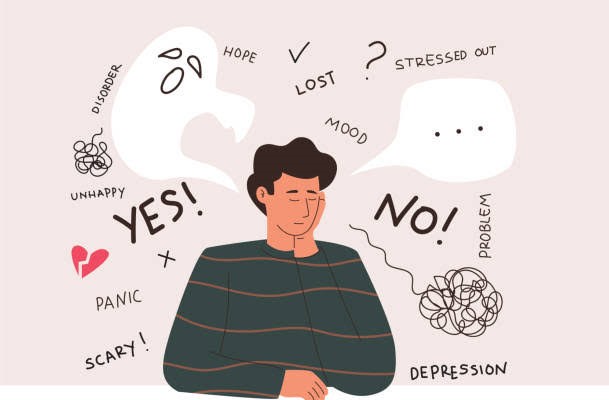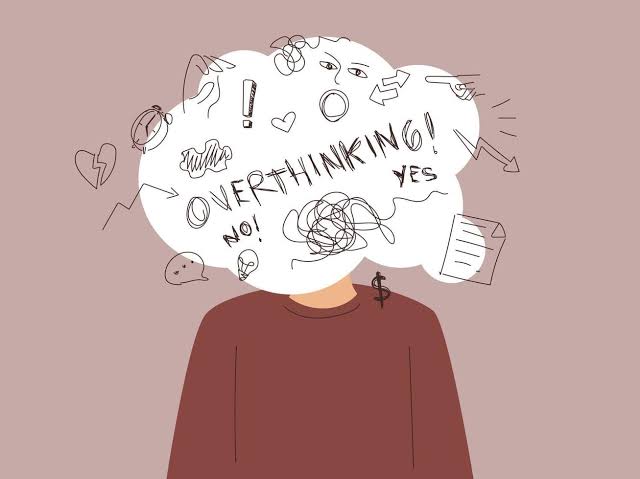Introduction
Overthinking can significantly impact mental health and well-being. Overthinking involves dwelling excessively on thoughts, often leading to anxiety and stress. It can be triggered by uncertainty, past experiences, or fear of the future.
Signs You’re Overthinking
If you’re wondering whether you are overthinking a particular situation or concern, there are a few things you can look for. Signs of overthinking include:
- An inability to think about anything else
- Being unable to relax
- Constantly feeling worried or anxious
- Fixating on things outside of your control
- Feeling mentally exhausted
- Having a lot of negative thoughts
- Replaying a situation or experience in your mind
- Second-guessing your decisions
- Thinking of all the worst-case scenarios
Bracing for Impact: The Effects of Overthinking
Overthinking is not a mental illness, and while overthinking can make you anxious, it is not necessarily the same thing as anxiety. However, it can often play a role in the development and maintenance of several mental health conditions. Some disorders that are associated with overthinking include:
- Depression
- Generalized anxiety disorder (GAD)
- Obsessive-compulsive disorder (OCD)
- Panic disorder
- Post-traumatic stress disorder (PTSD)
- Social anxiety disorder (SAD)
Overthinking can have a bidirectional relationship with mental health issues. Stressful events, depression, and anxiety can make people more prone to overthinking, and then this overthinking contributes to worse stress, anxiety, and depression. Finding a way to break out of this cycle can often help relieve some symptoms of these conditions.
Overthinking can also take a serious toll on relationships. Assuming the worst and jumping to incorrect conclusions can lead to arguments and conflicts with other people. Obsessing about every little thing other people do and say can also mean that you misunderstand what they are trying to convey. It can also lead to relationship anxiety and behaviors like constantly needing reassurance or attempting to control other people. Such behavior can harm your relationships with others.
How to Stop Overthinking
Getting out of your head can be a challenge. Research shows thinking less about a problem might actually be the key to developing better solutions. Here are a few ways to stop overthinking.
Distract Yourself
Rather than sit and think about a problem for endless amounts of time, you can distract yourself for a bit. Your brain may find better ways to work out a solution in the background while you’re distracted with another task like working in the garden. Or, you might “sleep on it” and discover that your brain solves the problem for you while you’re sleeping.
A brief distraction can give you a break. And it may get your mind focused on something more productive. And, your brain might even develop a solution for you when you stop thinking about the problem.
Challenge Negative Thoughts
Remind yourself that your thoughts are not facts. Every thought you have will not be truthful, accurate, or even realistic. Learning how to reframe them in a more positive way can help relieve the tendency to overthink.
Example: Negative thought: I am always saying the wrong things… I’m sure people think I am an idiot. Challenge: Is it true that I always say the wrong things, 100% of the time? Has anyone told me that I sound like an idiot?
Reframed thought: There are times I could articulate my thoughts more clearly and I feel frustrated when that happens. I am considering taking a speech class at the local college to improve my communication skills.
When you find yourself overthinking, challenge these thoughts. Ask yourself if they are realistic. Consider alternative scenarios. It can be difficult at first, but learning to call out your own overthinking can help you learn to replace negative thoughts with more helpful ones.
Work on Your Interpersonal Skills
Studies have found that improving your interpersonal skills can help stop you from overthinking since these skills have a large effect on this particular habit.6 Ways to develop stronger interpersonal skills include:
- Increasing your self-awareness
- Boosting your self-confidence
- Practicing self-control
- Learning to be assertive
- Setting boundaries
Meditate
Meditation can be an excellent tool for redirecting your thoughts more positively. As you meditate, work on focusing on your breath. The goal is not to clear your mind, but rather to focus it on something positive (or neutral) and practice redirecting your focus whenever your thoughts wander.
With practice, you will find it much easier to halt overthinking in its tracks before it becomes a more serious problem. Research has found that a 10-minute meditation can be an effective way to stop intrusive thoughts and worry.
Practice Self-Acceptance
Overthinking often stems from dwelling on past mistakes or worrying about things that you cannot change. Instead of berating yourself for things you might regret, try working toward being more accepting and compassionate of yourself. Research suggests that people who extend themselves such compassion are more likely to use adaptive coping strategies.
Strategies that may help you become more self-accepting include:
- Thinking about the aspects of yourself that you like and appreciate
- Practicing gratitude
- Cultivating a strong support system made up of people who can provide encouragement and love
- Forgiving yourself for things you regret
- Remembering that no one is perfect and everyone is a work in progress
Strategies to Manage Overthinking
- Mindfulness and Meditation: Practicing mindfulness can help you stay present and reduce ruminative thoughts.
- Set Time Limits: Allocate specific time to think about a problem, then move on to avoid endless contemplation.
- Focus on Solutions: Shift your mindset from problem-identifying to solution-oriented thinking.
- Journaling: Writing down your thoughts can help clarify them and reduce their intensity.
- Engage in Activities: Distracting yourself with hobbies, exercise, or socializing can break the cycle of overthinking.
Side Effects of Overthinking
Overthinking can lead to several side effects, including:
- Increased Anxiety: Constant rumination can heighten feelings of stress and anxiety.
- Depression: Persistent negative thoughts can contribute to depressive symptoms.
- Decision Paralysis: Overanalyzing can make it difficult to make choices or take action.
- Sleep Problems: Overthinking often disrupts sleep patterns, leading to insomnia or poor-quality sleep.
- Reduced Productivity: Time spent overthinking can detract from completing tasks and achieving goals.
- Physical Symptoms: It can manifest as headaches, muscle tension, or fatigue.
- Relationship Strain: Overanalyzing interactions can lead to misunderstandings and conflict.

Recommended Books That Can Help Address Overthinking
- The Power of Now by Eckhart Tolle
- Mindset: The New Psychology of Success by Carol S. Dweck
- The Art of Letting Go by John M. McCarthy
- Feeling Good: The New Mood Therapy by David D. Burns
- Atomic Habits by James Clear
Conclusion
In conclusion, overthinking can significantly impact mental and physical well-being, leading to anxiety, depression, and reduced productivity. Recognizing the signs of overthinking and adopting strategies such as mindfulness, cognitive restructuring, and seeking support can help manage its effects and promote healthier thought patterns. Addressing overthinking is crucial for overall well-being and personal growth.

